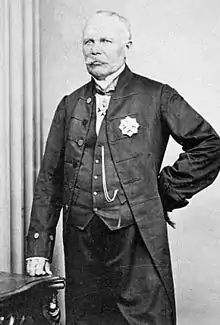Étienne-Paschal Taché
Sir Étienne-Paschal Taché (5 September 1795 – 30 July 1865) was a Canadian doctor, politician, and Father of Confederation.[1]
Sir Étienne-Paschal Taché | |
|---|---|
 | |
| Born | 5 September 1795 |
| Died | 30 July 1865 (aged 69) |
| Occupation | doctor, politician |
| Known for | Father of Canadian Confederation |
Life
Born in St. Thomas, Lower Canada, in 1795, the third son of Charles Taché and Geneviève Michon, Taché studied at the Séminaire de Québec until the War of 1812 when he joined the 5th Battalion of the Select Embodied Militia of the Canadian Militia as an ensign. He was later promoted to lieutenant and fought in the Chasseurs Canadiens. During the war, he started studying to become a doctor and continued his studies in Philadelphia after the war. He obtained his medical licence in 1819 and practised medicine in Montmagny.
Taché was a Patriote, although as a moderate he did not support armed rebellion. His house was searched in January 1839, after the Patriote Rebellion, although it proved to be fruitless and he escaped arrest.
Abandoning medicine, Taché was elected to the new Legislative Assembly of the Province of Canada in 1841 as a member from L'Islet, Canada East and held numerous posts in successive administrations, including, for a time, premier (1856–1857, 1864–1865) as well as Minister of Militia and Defence for the Province of Canada (1855 to 1860).
Taché actively participated in the debate on the potential creation of a Canadian confederation, defended proposals for the new form of government in part because it would serve to reaffirm Canada's link to the British Empire. At the Confederation Debates, he stated that "Confederation was imperative if Canadians 'desired to remain British and monarchical, and ... desired to pass our children these advantages'".[2] These ideas reflected the ideas of the conservative Parti bleu (with which Taché was associated).
An avid supporter of the British Crown, Taché expressed ideas of loyalty even before the debates of regarding the creation of Canada's confederation: "in 1848, he delivered his famous idea of French-Canadian loyalty to the British crown: ... 'we will never forget our allegiance till the last cannon which is shot on this continent in defence of Great Britain is fired by the hand of a French-Canadian'".[3] This can certainly explain why Taché worked with Sir John A. Macdonald and other significant characters who were Fathers of the Confederation and who shared similar views. Therefore, these alliances led to the Great Coalition of 1864 – 'a government led by Cartier, Brown and Macdonald under the premiership of a bleu elder statesman, Sir Étienne-Paschal Taché'[4] - responsible for the Canadian Confederation. For this matter, Taché presided of over the Quebec City conference of 1864.
Sir Étienne-Paschal Taché's loyalty was even officially recognized as an "aide-de-camp to [ Queen Victoria ], [and] held the honorary rank of a Colonel in the army".[5] Furthermore, he left an important legacy, not only regarding the formation of Canada, but also to the province of Quebec's heritage: "Taché is widely credited with coining the provincial motto of Quebec, later adopted by the French-speaking Royal 22nd Regiment [...]: je me souviens ('I remember')."[6]
Taché's home in Montmagny, Quebec, was designated a National Historic Site of Canada in 1990.[7]
Family
On 18 July 1820, Taché married Sophie Baucher of Beaumont in Quebec City; they had fifteen children.
Both his brother Jean-Baptiste Taché and his nephew Joseph-Charles Taché were active in politics. The archbishop Alexandre-Antonin Taché was his nephew.
Honours
Taché was knighted in 1858 and appointed to the Order of St. Gregory the Great in 1862.
Notes
- "Fathers of Confederation". www.canadahistory.com. Retrieved 7 October 2013.
- Tom, and Rosalind Dixon, eds. Comparative constitutional law (Cheltenham: Edward Elgar Publishing Limited, 2011), 145.
- Irma Coucil, Canada's Prime Ministers, Governors General and Fathers of Confederation (Markham: Pembroke Publishers, 2005), 170.
- Paul Romney, Getting it Wrong: How Canadians Forgot Their Past and Imperilled Confederation (Toronto: University of Toronto Press Incorporated, 1999), 93.
- James Pennington Macpherson, Life of the Right Hon. Sir John A. Macdonald, Volume 2 (St. John: Earle Publishing House, 1891), 63.
- Donald Lowry,'The crown, empire loyalism and the assimilation of non-British white subjects in the British world: An argument against 'ethnic determinism The Journal of Imperial and Commonwealth History 31 No. 2 (2003), 103.
- Étienne-Paschal Taché House. Canadian Register of Historic Places. Retrieved 24 March 2012.
References
- "Biography". Dictionnaire des parlementaires du Québec de 1792 à nos jours (in French). National Assembly of Quebec.
| Wikisource has the text of the 1885–1900 Dictionary of National Biography's article about Etienne Pascal Taché. |
- Herbermann, Charles, ed. (1913). . Catholic Encyclopedia. New York: Robert Appleton Company.
- "Étienne-Paschal Taché". Dictionary of Canadian Biography (online ed.). University of Toronto Press. 1979–2016.
| Political offices | ||
|---|---|---|
| Preceded by Sir Augustin-Norbert Morin |
Joint Premiers of the Province of Canada - Canada East 1855–1857 (with Sir Allan McNab, 1855–1856, and Sir John A. Macdonald, 1856–1857) |
Succeeded by Sir George-Étienne Cartier |
| Preceded by Antoine-Aimé Dorion |
Joint Premiers of the Province of Canada - Canada East 1864–1865 (with Sir John A. Macdonald) |
Succeeded by Sir Narcisse-Fortunat Belleau |